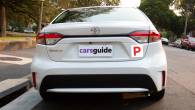The lightning fast speed of change means that sometimes we quickly forget how amazing the breakthroughs of yesterday were. There are even people alive who can remember how difficult and boring life was before the smart phone.
Take ABS (Anti-lock Braking System), for example. Before its arrival, in the mid-1980s, people needed to know what "threshold braking" was, and wheels did regularly lock up, and skid, with predictable repercussions. Today we can tromp the brake pedal as if it's covered in spiders, and even steer while we're stopping.
These kind of motoring innovations seem to be ceaselessly rolled out and, like ABS, there are many that we'd hate to have to live without. And just a few that we wish we could.
Early adopters - don't start/stop too soon
One of the notes of caution that we should ring here is that the first versions of some amazing technologies are sometimes a bit buggy, just like other bits of software.
Start/stop systems, for example, which shut off your car's engine to save fuel - and emissions - when you're sitting at traffic lights are increasingly prevalent.
Today's modern systems react as soon as they feel you lessening your pressure on the brake pedal, kicking the engine into life extremely quickly so that you're ready to go.
The very first versions of the technology - in the mid-noughties - were not always so fast at the "start" bit, meaning you could find yourself being a little less fast off the line at an intersection than you'd like to be, and giving you quite a scare.
Start/stop might be a pocket-friendly, tree-hugging technology but it also divides opinions. More than a few people press the button to disable it as soon as they start up their cars, because they find the rattle on restart, the silence when it's off, or the way their power steering suddenly goes dead disturbing.
Start/stop can be particularly disruptive in diesel-engined cars, of course, where the start-up process is harder to keep smooth and silent.
The latest Audi systems, however, in the A4 and A6 Allroad quattro for example, are quiet and clever, cutting the engine as soon as your speed drops below 7km/h, and before you even come to a stop, for better efficiency, and restarting with subtlety.
It might be one of those things you think you can live without, until petrol prices go up again, and at least you can always turn it off.
Going for a cruise
Cruise control, which was already popular in the US in the 1970s, but caught on slower here, was one of those technologies that looked like the beginning of the end for driving. Once we could set a speed, take our feet off and just twiddle the wheel, autonomous cars seemed just a short drive away, and yet they still haven't quite arrived (Lexus announced it would have an optional autonomous system available in Australia in 2015, but it has since gone very quiet on the promise).
What a lot of modern cars do have is Active Cruise Control (also the basis of the Lexus autonomous system), which on high end cars can take the car from a complete stop, up to your chosen speed and then adjust itself to the pace of traffic in front of you.
ACC mainly uses radar to measure the distance to an object in front of you, and your closing speed, and applies the brakes and throttle for you accordingly.

Unless you're in a really high price bracket, Active Cruise is generally going to be an optional extra, and quite an expensive one, so is it worth the extra spend?
That depends on the driver. Again, there are many people who foreswear all kinds of cruise control, because they claim it makes for dopey, uninvolved drivers, and they prefer to keep a constant contact with the car through throttle and brakes.
Those in the "pro" camp tend to point out that setting the cruise control, everywhere you go, particularly in Victoria, can save you a lot of unnecessary speeding fines.
Seeing versus hearing
While reversing cameras are increasingly turning up as standard equipment in even tiny, cheap cars, they are one option a lot of people would happily swap for parking sensors, which measure the distance between your bumpers and solid objects and beep you the distance, like a car sonar system.
Personally, as someone who drives, and reverse parks, many different cars each year, parking sensors are the one option I hate being without, whereas the absence of a reversing camera is something I barely notice (being old school, I tend to turn my head and use my eyes instead).
Sure, you should be able to tell how far your car is from things, but the beeps really are a fantastically simple aid. A camera gives you a slightly narrow view of the road behind you, but some of them aren't particularly helpful for judging distance, particularly at night.
Some cars only offer park sensors on the rear of the car, but this is unacceptable, because once you've got used to the beepers, you really want them at both ends.
The must haves
Bluetooth
Along with parking sensors, the modern features we can't live without include Bluetooth pairing for your phone - the only way you should ever make calls on the move, and better than using the radio for music.
Airbags
Not an option, a necessity, and make sure you've got an appropriate number in the rear, too, if you have children.
ESP
Electronic Stability Program. So good it's now illegal not to have it, and a potential life saver.
Blind Spot Warning

Introduced by Volvo in 2007 and now widely available, this clever system scans the lane beside you when you indicate and will warn you if you're about to take out a motorbike, or a car, hidden in your blind spot.
Not everyone is good at doing head checks, and it's impossible to calculate how many accidents these systems would have already prevented, but it would be a big number.
Lane Keep Assist System
Honda rolled out this ingenious system in 2003, which recognises lane markings and will adjust your steering angle should you start to veer out of your lane.
Simpler Lane Departure Warning systems are more common and merely provide a warning, by buzzing your steering wheel or through an alarm.

Again, some drivers find these systems annoying and unnecessary, but if it only saves you once...


.jpg)

.jpg)
 copy.jpg)


.jpg)
.jpg)




.jpg)





Comments